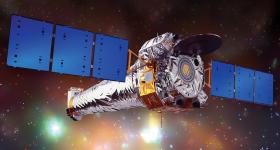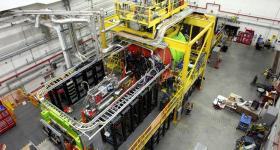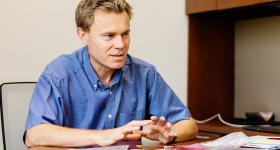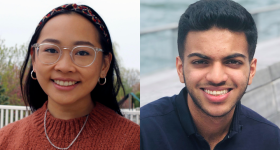Astrophysics graduate students (Steven Chen, Brendan O'Connor, Hui Yang) gave talks at the Chandra Frontiers in Time-Domain Science 2020.


In the Physics Department, students gain hands-on research experience with department faculty, innovative equipment and scientists from some of the world's top institutions. For more than a century, the department has spearheaded important discoveries in our labs and fostered generations of researchers, systems engineers, environmental scientists and biomedical engineers. Outside the department, our faculty hold leadership roles with partner institutes around the world, offering students unparalleled research and employment opportunities.
With lab groups across many interest areas, undergraduate and graduate students can build their research experience and present, publish and win awards for their work. Research is ongoing in experimental and theoretical nuclear physics, experimental and theoretical biophysics, and high-energy astrophysics.
“[The university] combines the academic environment and also the research environment because GW is located in a hub of educational institutions and research centers. … The people that exist at and near the university are such fantastic scientists and personalities.”
Chryssa Kouveliotou
Professor of Astrophysics


The Physics Department operates out of historic Corcoran Hall and the state-of-the-art Science and Engineering Hall (SEH). Labs are outfitted with cutting-edge equipment. The department also partners with researchers from other sciences at SEH, and faculty collaborate with many of the country's top research institutions located in the Washington, D.C., area.
Completed in the basement of Corcoran Hall in September 2024, the cluster is envisioned as infrastructure to support the teaching and research mission of the Physics Department.


Astrophysics graduate students (Steven Chen, Brendan O'Connor, Hui Yang) gave talks at the Chandra Frontiers in Time-Domain Science 2020.

Physics Collaboration Seeks to Shed Light on Particle Formation
GW researchers from the Physics Department are leading an international collaboration to expand capabilities at a U.S. Department of Energy national accelerator laboratory and provide...

Cross-Disciplinary Research to Quantify Evolution, Spread of Misinformation
Physics professor Neil Johnson and his collaborator Yonatan Lupu have been awarded a three-year, $1.86 million grant from the Department of Defense to study how...

Getting Creative: Student Research in the Virtual Learning Environment
For physics major Ujwal Kumar, the COVID pandemic turned everything upside down — including his astrophysics research on gamma ray bursts. But thanks in part to CCAS' STEM Summer...
